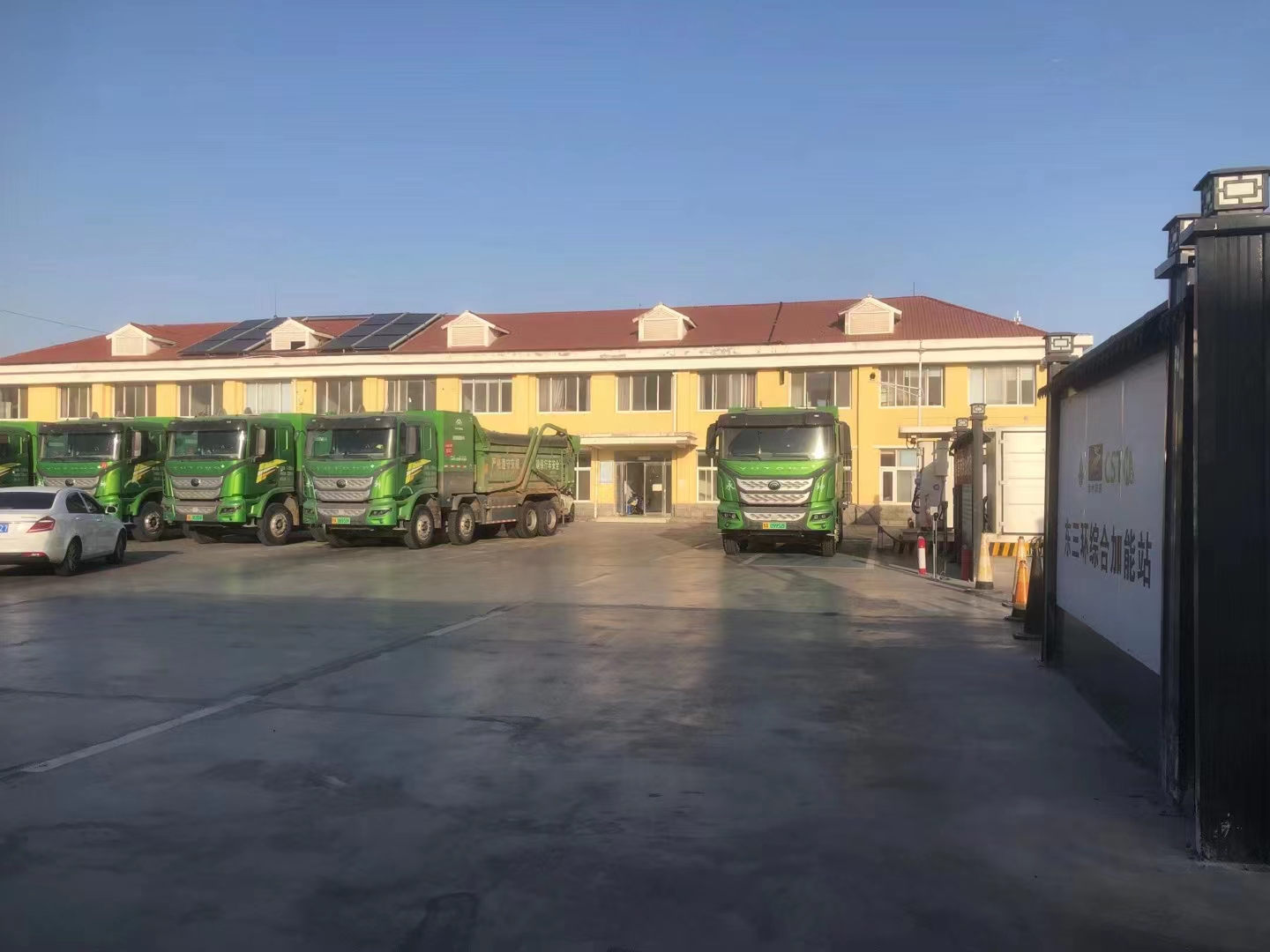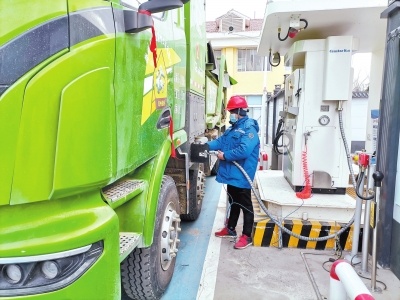Zhengzhou's first hydrogen-powered vehicle refueling station is about to open! Once completed, it will be able to meet the daily refueling needs of 50 hydrogen fuel cell vehicles in the surrounding area.
2022-12-15

With a total investment of 180 million yuan and covering an area of 10 mu, the Zhengzhou East Third Ring Comprehensive Refueling Station has a designed daily refueling capacity of more than 1,000kg. Once completed, it will be able to meet the daily refueling needs of 50 hydrogen fuel cell vehicles in Jinshui District and the surrounding areas.
This station is the first of ten refueling stations planned in the 2022 Fuel Cell Vehicle Demonstration and Application Work Plan for Zhengzhou City. How is the progress of this station, and has it been put into use? What impact does the project have on the citizens?
The Zhengzhou East Third Ring Hydrogen Refueling Station has entered the commissioning stage
On December 12th, a wind warning was issued in Zhengzhou. At the refueling station located at the original Yellow River Bridge service area at the intersection of Jincheng Avenue and the East Third Ring Road, a reporter from Dahe Daily·Yu Video saw that worker Zhang Chao, wearing a safety helmet and a blue work uniform, had arrived early at the station. He was checking whether the equipment was affected by the windy weather. When a vehicle arrived to assist in testing the equipment, he guided the driver slowly, saying "move forward, a little more, good!” After the vehicle came to a stop at the designated location, he cleaned the surrounding dust before starting to refuel the vehicle with hydrogen gas.
"Hydrogen is environmentally friendly and energy-saving, and its exhaust is just water, which does not cause pollution to the environment,” Zhang Chao explained. To ensure the smooth and safe operation of the project when it officially opens, they currently arrange for heavy-duty trucks to assist in equipment testing, and it takes about 15 to 20 minutes to fill a truck with hydrogen.
Industry insiders believe that compared to pure electric vehicles, hydrogen fuel cell vehicles have the characteristics of short refueling time, zero emissions, and zero pollution, making them particularly suitable for low-temperature, mountainous, heavy-duty, and other application scenarios.
Zhengzhou's first commercial hydrogen station will soon be in operation
A driver who came to refuel at the station admitted that he thought his vehicle not only became more environmentally friendly after refueling with hydrogen, but also had longer range and more power. Zhang Chao also spoke highly of hydrogen fuel vehicles. He said that the station is currently connecting with the national platform and will soon be officially open to the public.
In this regard, Shan Yiming, a lecturer at Henan University of Technology and a researcher at the Supervision and Rule of Law Research Center, said in an interview with a Dahe Daily Yu Video reporter that under the background of increasingly stringent environmental protection policies and energy structure adjustments, hydrogen fuel is increasingly recognized in both international and domestic markets. The construction of Zhengzhou's first commercial refueling station is undoubtedly a significant breakthrough for local economic development and environmental protection.
According to the report by Dahe Daily Yu Video, the Zhengzhou East Third Ring Comprehensive Refueling Station is the first commercially operated refueling station in Zhengzhou, developed by the Jinshui Investment Group in collaboration with Censtar New Energy Technology Co., Ltd., and Sinopec Zhengzhou.
The station was renovated in August 2022 and completed in September 2022. Due to the impact of the COVID-19 pandemic, equipment installation and commissioning were interrupted, and the equipment commissioning was completed on December 10th. Currently, the station is uploading data to the national hydrogen and fuel cell vehicle demonstration and evaluation platform. Once the data uploading is complete, the station will be ready for operation.
Jinshui District plans to build 5~10 hydrogen stations
In December 2021, the Ministry of Finance and four other ministries jointly issued a document approving the launch of fuel cell vehicle demonstration and application work in the Zhengzhou urban agglomeration. The task is to promote the application of fuel cell buses and trucks as the main driving force, supported by collaborative innovation, demonstration applications, hydrogen energy security, and policy support, in order to build an independent industrial chain for fuel cell vehicles.

As an important part of Zhengzhou's efforts to become a demonstration city for fuel cell vehicles, the construction of this refueling station can promote decarbonization of the automotive industry, achieve green and sustainable development, connect the "upstream" hydrogen production and "downstream" application hubs, and accelerate the industrialization process of hydrogen fuel cell vehicles.
As a new first-tier city, what are the specific plans for Zhengzhou's future development?
The above-mentioned staff members stated that a new fueling station is planned to be built in 2023, and subsequent projects will be constructed one after another. The plan is to build 5-10 comprehensive refueling stations within the jurisdiction of Jinshui District, which will meet the hydrogen refueling needs of 300 hydrogen fuel cell vehicles in Zhengzhou every year. In addition, a 50-mu industrial land will be planned to establish a research and development, testing, inspection, conference, and training center for the upstream and downstream of the hydrogen energy industry chain, as well as to cultivate and incubate hydrogen industry institutions and professionals. Furthermore, a high-efficiency agricultural project will be developed by combining mushroom cultivation and distributed photovoltaics on rooftops, with the goal of building high-standard mushroom planting facilities that can produce 30 million kilograms of edible mushrooms per year and generate 70 million kilowatt-hours of electricity annually.
According to a report by Dahe Daily, in addition to Zhengzhou, hydrogen stations have been built in Beijing, Hebei, Sichuan, Yunnan, etc.. Shanghai alone has built 14 hydrogen stations, with plans to build around 70 by 2025.
With the rapid increase of hydrogen fuel vehicles, can the construction of hydrogen stations keep up? In terms of cost, which is more competitive, hydrogen refueling or gasoline refueling?
The latest statistics show that the number of hydrogen stations in China has increased by 100 in one year, and it is estimated that the number will increase significantly by 2025.
Liu Yafang, Deputy Director of the Energy Conservation and Technology Equipment Department of the National Energy Administration, recently stated that China has built more than 250 hydrogen stations cumulatively, accounting for 40% of the global total, and the number of hydrogen stations ranks first in the world. Breakthroughs have been made in 35 MPa intelligent fast hydrogen dispenser technology and 70 MPa integrated mobile hydrogen station technology.
Expert suggestion: Zhengzhou should introduce hydrogen station management measures as soon as possible
According to an investigation by reporters from Dahe Daily Yu Video, the construction of hydrogen stations in some cities is hindered by various factors, such as complex approval processes, high investment costs, and limited profitability. These factors act as "roadblocks" to the development of hydrogen stations. Regarding the approval process, constructing a hydrogen station in certain areas requires the involvement of more than ten government departments and the issuance of dozens of official seals. In terms of investment, in some economically developed regions, the cost of land alone can reach tens of millions of yuan or even more.
In response to this, Shan Yiming pointed out that from a legal perspective, there are two issues that need to be addressed in the establishment and operation of hydrogen stations. Firstly, there is a general lack of legal regulation. The planning, construction, operation, management, safety and legal responsibilities of hydrogen stations involve multiple departments, but there is currently a lack of systematic regulations in these aspects, which may result in unclear job responsibilities. In the absence of perfect legal regulations, it is urgent for local legislative bodies to introduce local management measures. Before high-level normative documents are issued, the local government where the hydrogen station is located should actively fulfill its territorial jurisdiction responsibilities to prevent uncontrollable management issues. Otherwise, it may bear corresponding administrative responsibilities in case of problems.
Secondly, there is a need for safety precautions in daily operations. China's revised "Law on Production Safety" in 2021 emphasizes the concept of "people-oriented" and prioritizes people's lives. Hydrogen is listed as a hazardous chemical in the hazardous chemicals list, and recent incidents involving hydrogen both domestically and internationally have proven the difficulty in completely eliminating the dangers associated with hydrogen. Therefore, safety must be the top priority in the operation of hydrogen stations. For example, before operation, attention should be given to providing safety training for employees and obtaining safety qualifications. Additionally, hydrogen sensors should be properly arranged and installed to ensure timely detection of any issues. In general, effective supervision by government agencies is required, and companies need to tighten their safety awareness to seek a balance between promoting development and ensuring safety. (Planning: Dahe Daily·Yu Video Community Interactive Operation Center)

